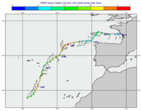create_geo
- create_geo(number_of_points[, format[, number_of_values_columns[, value_columns]]])
- create_geo(number_of_points, **kwargs)
Creates a new
Geopointswith the givennumber_of_points, all set to default values and coordinates.- Parameters
fs (
Geopoints) – input geopointsnumber_of_points (number) – number of points
format (str) – geopoints format (see below)
number_of_value_columns (number) – the number of value columns for the “ncols” formatted
value_columns (list) – the name of the value columns for the “ncols” format
kwargs – see below
- Return type
It is intended that this function be used in conjunction with the “set_* geopoints” functions in order to populate the geopoints with data.
If no
formatis specified a “traditional” 6-column format geopoints is created. Otherwiseformatdefines the actual format. The possible values are as follows: ‘polar_vector’, ‘xy_vector ‘, ‘xyv ‘ and ‘ncols’.If
formatis “ncols”, then the number of value columns can be given bynumber_of_value_columns(default is 1). In this case, thevalue_columnscan be used to provide a list of names of the value columns.An alternative, and more efficient way to create a new geopoints variable if you already have the data to populate it, is to provide a set of keyword arguments (
kwargs) as shown in the examples below. Using this syntax, you can completely create a new geopoints variable with all its column data in one go. This is much more efficient than creating an empty geopoints variable and then populating it using the ‘set_*’ functions.- Examples
import metview as mv import numpy as np # default geopoints format, 8 values g = mv.create_geo(8) # "xyv" formatted geopoints with 9 values g = mv.create_geo(9, "xyv") # "ncols" format with 3 named columns, each containing 4 values g = mv.create_geo(4, "ncols", 3, ['t', 'z', 'precip']) # default geopoints format, with keyword arguments g = mv.create_geo(type='standard', latitudes=np.array([4, 5, 6]), longitudes=np.array([2.3, 1.1, 6.5]), levels=850, # all rows will have 850 as their level values=np.array([1.1, 2.2, 3.3]), times=None) # "xyv" geopoints format, with keyword arguments g = mv.create_geo(type="xyv", latitudes=np.array([4, 5, 6]), longitudes=np.array([2.3, 1.1, 6.5]), values=np.array([1.1, 2.2, 3.3])) # "ncols" geopoints format, with keyword arguments g = mv.create_geo(type="ncols", latitudes=np.array([4, 5, 6]), longitudes=np.array([2.3, 1.1, 6.5]), levels=850, # all rows will have 850 as their level times=None, stnids=['aberdeen', 'aviemore', 'edinburgh'], temp=np.array([273.15, 269.78, 281.45]), precip=[4, 5, 1], # lists also work, but are less efficient speed=np.array([2, 3, 5]))

